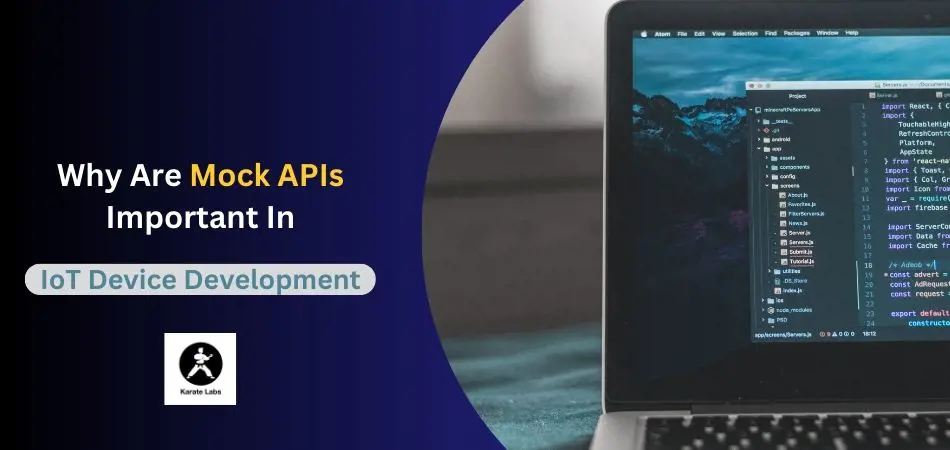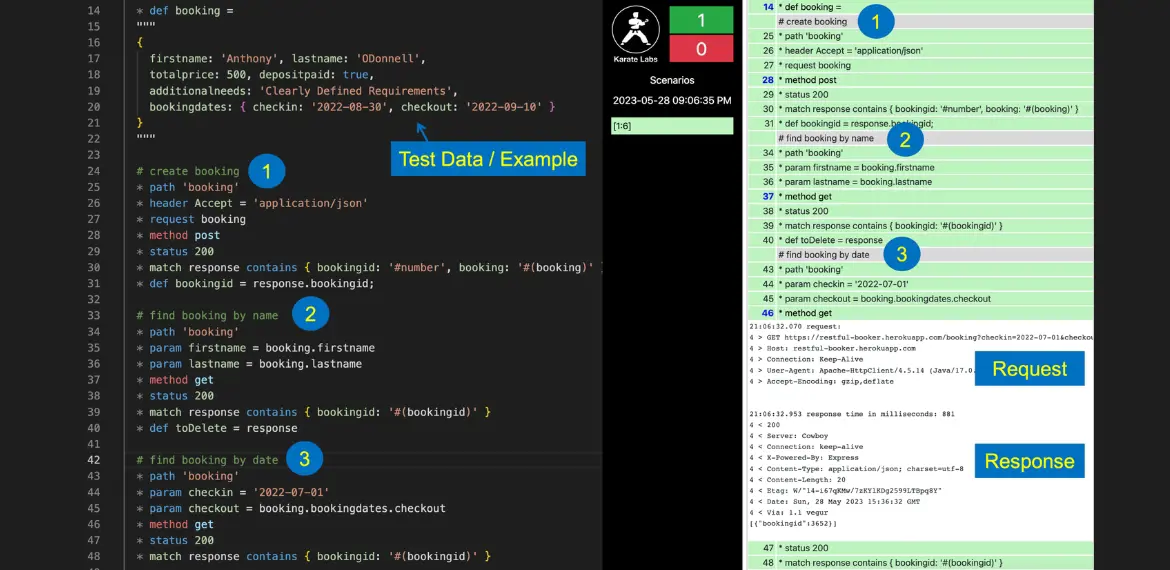Why Are Mock APIs Important In IoT Device Development?

IoT (Internet of Things) device development is marked by innovation, connectivity, and complex systems orchestrating our physical world in the digital age. IoT devices, ranging from smart thermostats to industrial sensors, rely on a network of backend services and APIs to function seamlessly. Yet, developing these devices is challenging, especially when dealing with the dependency on external assistance and the need for rigorous testing.
In this context, the importance of API mocks in IoT device development comes to the fore. API mocks software serves as a strategic ally, offering a simulated environment replicating the behavior of accurate backend services. They enable IoT developers to expedite the development cycle, streamline testing, and ensure the robustness of their devices, all while reducing costs and dependencies.
Today, we will discuss the critical role that API mocks play in the IoT landscape. We'll uncover why they are indispensable for IoT device development, examining their advantages in testing, simulation, and efficiency.
The IoT Landscape
The Internet of Things (IoT) stands as a groundbreaking paradigm, seamlessly intertwining the physical and digital realms and transforming how we perceive and interact with the world around us. In this expansive and intricate landscape, everyday objects are endowed with intelligence, connectivity, and the ability to communicate, ushering in unprecedented possibilities.
At the heart of the IoT landscape lies the interconnected web of devices, sensors, and systems, all meticulously designed to gather, transmit, and analyze data. From smart homes equipped with intelligent appliances to industrial setups brimming with sensors monitoring machinery, the IoT ecosystem spans diverse sectors, including healthcare, transportation, agriculture, and beyond.
The Need for Mock APIs
The need for efficient and effective testing and development processes has never been greater. This is where mocks testing comes into play, providing a valuable solution to many challenges developers, testers, and businesses face.
- Development Parallelization:
Mocks API enables parallel development. While backend services are still under development, front-end developers can begin work by connecting to mock APIs that simulate the expected behavior. This reduces development bottlenecks and accelerates time-to-market.
- Testing Independence:
Testing teams can work independently and efficiently. Testers can create test scenarios and cases using mock APIs before the services fully function. This early testing can reveal issues and allow for timely fixes.
- Error Simulation:
Mock APIs are invaluable for simulating error conditions and edge cases. Developers and testers can intentionally introduce errors or specific responses to ensure the application handles exceptions gracefully. This is crucial for identifying and addressing potential vulnerabilities.
- Cost-Efficiency:
Developing and maintaining real backend services can be costly, especially in the early stages of a project. Mock APIs eliminate the need for fully functional backend services during development, saving on operational expenses.
- Regression Testing:
Mock APIs can be instrumental in regression testing. They ensure that existing functionalities continue to work as expected after each update or change in the application, helping maintain software quality.
- Load Testing:
Mock APIs can simulate heavy loads and traffic conditions, allowing developers and testers to identify performance bottlenecks and ensure the application can handle real-world usage scenarios.
What Are Mock APIs?
Mocks API, or Mock Application Programming Interfaces, are simulated or virtual representations of real APIs. They mimic the behavior and responses of actual APIs without relying on honest backend services. Mock APIs play a pivotal role in various phases of software development. They enable front-end and backend developers to work in parallel by allowing the user interface to connect to these simulated APIs before the actual services are fully developed, expediting the development process. Testing teams benefit from mock APIs as they can initiate testing independently, ensuring timely issue identification and resolution, even if services are not operational.
Additionally, mocks testing is instrumental in simulating error conditions, security vulnerabilities, and diverse test scenarios, helping evaluate an application's robustness. Moreover, they reduce operational costs by eliminating the need for fully functional backend services during development, making them an invaluable tool for innovative and cost-effective software development.
Benefits of Using Mock APIs in IoT Development
Using Mock APIs in IoT (Internet of Things) development offers many benefits, enhancing the efficiency and effectiveness of the development process in various ways. Here are some key advantages:
- Faster Development:
API mocks software enables IoT developers to work on device functionality independently from backend services. This accelerates development by eliminating the need for real benefits to be fully developed and operational.
- Parallel Development:
Mock APIs allow front-end and developers to work concurrently. Front-end developers can create the user interface and connect it to Mocks API before the services are fully developed. This parallelization speeds up the development process.
- Early and Independent Testing:
Testing teams can commence their work early in the development cycle using mock APIs. They can create test scenarios and perform tests, ensuring the application's functionality is checked thoroughly, even when the real services are unavailable. Early testing helps in identifying issues promptly and facilitates timely bug fixes.
- Error Simulation:
Mocks API enables developers and testers to simulate various error conditions and edge cases. By intentionally introducing errors or specific responses, they can evaluate how the IoT device handles exceptions. This is crucial for assessing the device's robustness and ability to manage exceptional situations gracefully.
- Cost Efficiency:
Developing and maintaining real backend services can be expensive, especially in the initial stages of an IoT project. API mocks software eliminates the need for fully functional backend services during development, saving on operational costs.
Types of Mock APIs
Various mock APIs are used in software development and testing to simulate different aspects of services and components. Let's look at the three types you've mentioned:
- Stubs
Stubs are lightweight mock objects that simulate specific method calls or API interactions. They provide predetermined responses or behaviors when called, often in a predictable and controlled manner.
Stubs are commonly employed in unit testing to isolate the component under test. They help replace real, possibly complex, dependencies with simplified, predictable behavior. For instance, in a unit test for a payment processing module, a stub can simulate a payment gateway's response without actually making a financial transaction.
Stubs focus on specific method calls or interactions and offer predefined responses. They help developers ensure that a component interacts correctly with external services or dependencies.
- Fakes
Fakes are more comprehensive than stubs and provide functionality, albeit in a simplified form. They aim to replicate the behavior of real components or services while simplifying their operation or reducing their complexity.
Fakes are often used in integration testing and scenarios where developers must interact with external services or components. For example, in testing a database-driven application, a fake database might mimic the behavior of a real database while storing data in memory.
Fakes provide actual functionality but in a controlled and simplified manner. They are precious when dealing with services or components that are not easily accessible or where interacting with the substantial benefit would be impractical.
- Dummies
Dummies are the simplest form of mock objects and are placeholders. They are created to fulfill method or parameter requirements but do not provide any actual functionality. Dummies are typically used when the tested method requires an argument to be passed, but the specific idea is irrelevant to the test scenario.
Dummies are frequently used when the method under test has a required parameter irrelevant to the test, but the parameter cannot be omitted or set to null. A dummy is passed as a placeholder to satisfy the requirement.
Dummies are non-functional objects. They do not simulate any behavior or response and exist solely to meet method or parameter requirements in a test or code scenario.
Building and Customizing Mock APIs
- Select a Mock API Framework or Library:
Choose API Mocks framework or library that suits your development and testing needs.
- Define the Mock API's Behavior:
Determine the behavior you want the mock API to exhibit, including specifying the responses it should provide and the scenarios it should simulate.
- Design the Endpoints:
Define the API endpoints you need for your mock. These endpoints should mimic the real API's structure and functionality.
- Customize Responses:
Tailor the responses generated by the mock API to replicate the behavior of the real service.
- Handle Different Scenarios:
Mock APIs should be versatile enough to handle various testing scenarios.
- Configure Delay and Latency:
Introduce artificial delays and latencies in responses to simulate network conditions and test your application's resilience.
- Enable Dynamic Data Generation:
Sometimes, you may want the mock API to generate dynamic data.
- Mock Authentication and Authorization:
Configure the mock API to mimic these security mechanisms if your application relies on authentication and authorization.
Test Mock APIs with Karate Labs
Karate Labs proudly presents its open-source test automation platform, a game-changer for developers, quality assurance professionals, and DevOps engineers. Karate Labs offers the freedom and flexibility of open-source testing, putting you in control of your testing processes. Say farewell to costly licensing fees and proprietary constraints – with Karate, you can customize and utilize our API mocks software to suit your needs. Karate stands out with its intuitive syntax and expressiveness, simplifying the creation and maintenance of tests allowing you to focus on the quality of your software.






